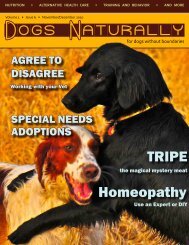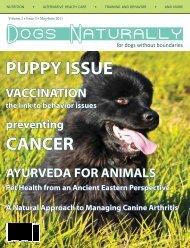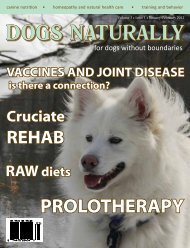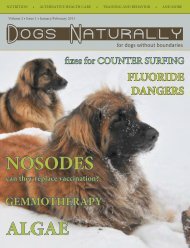July/August 2010 - Dogs Naturally Magazine
July/August 2010 - Dogs Naturally Magazine
July/August 2010 - Dogs Naturally Magazine
You also want an ePaper? Increase the reach of your titles
YUMPU automatically turns print PDFs into web optimized ePapers that Google loves.
y: Jan Rasmussen<br />
TRUTHS, OMISSIONS AND PROFITS<br />
It’s getting warmer outside — time for<br />
sellers of heartworm medications to<br />
start scaring you to death. Television<br />
and print ads, which used to push meds<br />
only during warm summer months,<br />
now urge you to keep your dog on<br />
medication year round. The question is:<br />
why the change?<br />
Drs. David Knight and James Lok of the<br />
University of Pennsylvania School of<br />
Veterinary Medicine, addressing recommendations<br />
for year round meds,<br />
warned: “The practice of some veterinarians<br />
to continuously prescribe<br />
monthly chemoprophylaxis exaggerates<br />
the actual risk of heartworm transmission<br />
in most parts of the country and<br />
unnecessarily increases the cost of protection<br />
to their clients.”<br />
So, is the change to year round meds all<br />
about money? Or is there more to this<br />
story?<br />
Heartworm “prevention” is a major<br />
health decision for pet parents and<br />
multi-billion dollar Big Business<br />
for drug companies, veterinarians, testing<br />
laboratories and on-line sellers of<br />
medication. When health intersects<br />
money, there’s a lot of room for conflict<br />
of interest. Only by understanding the<br />
business aspects and the truth about<br />
heartworm transmission can you make<br />
an informed decision about if, how and<br />
when to protect your dog with commercial<br />
products.<br />
While everyone agrees that heartworm<br />
infestations can be life-threatening, infestation<br />
is far from inevitable nor is it<br />
the immutable death sentence advertisers<br />
would have you believe.<br />
(Otherwise, all dogs and cats not on<br />
meds would die of infestation. But they<br />
don’t.)<br />
Every holistic vet I’ve consulted had<br />
concerns about the long-term safety of<br />
heartworm medications. Well-known<br />
vet, author and columnist Martin Goldstein<br />
wrote in his wonderful book The<br />
Nature of Animal Healing that he sees<br />
heartworms as less epidemic than the<br />
“disease-causing toxicity” of heartworm<br />
medicine.<br />
Dr. Jeff Levy, vet and homeopath, concluded<br />
“that it was not the heartworms<br />
that caused disease, but the other factors<br />
that damaged the dogs’ health to<br />
the point that they could no longer<br />
compensate for an otherwise tolerable<br />
parasite load.” Those factors include, “…<br />
being vaccinated yearly, eating commercial<br />
dog food, and getting suppressive<br />
drug treatment for other symptoms….”<br />
Heartworm meds do not, by the way,<br />
prevent heartworms. They are poisons<br />
that kill heartworm larvae (called microfilariae)<br />
contracted during the previous<br />
30-45 days (and maybe longer due<br />
to what is call the Reach Back Effect).<br />
The heartworm industry authority, The<br />
American Heartworm Society (and their<br />
cat heartworm site) offers a wealth of<br />
information. Their website is a public<br />
service but also a marketing tool aimed<br />
at buyers and resellers of heartworm<br />
meds. Sponsors of this website are a<br />
Who’s Who of drug companies. Fort<br />
Dodge Animal Health (Wyeth), Merial<br />
and Pfizer are “Platinum Sponsors.”<br />
Bayer merits Silver. Novartis, Schering-<br />
Plough, Virbac and Eli Lilly get Bronze.<br />
Most of these<br />
companies have sales reps that regularly<br />
call on vets and show them how to<br />
sell you heartworm meds. With any<br />
purchase of any drug, we recommend<br />
you ask for information regarding possible<br />
adverse effects, the necessity for<br />
taking this drug and available alternatives.<br />
How Heartworms Infect <strong>Dogs</strong>: It’s<br />
Not Easy!<br />
Well, now that we’ve looked behind the<br />
scenes of the heartworm industry, let’s<br />
take a look at how the heartworms<br />
themselves (called Dirofilaria immitis)<br />
do business. Seven steps must be completed<br />
to give your dog a dangerous<br />
heartworm infestation:<br />
Step 1: To infect your dog, you need<br />
mosquitoes (so you need warm temperatures<br />
and standing water). More<br />
specifically, you need a hungry female<br />
mosquito of an appropriate species. Female<br />
mosquitoes act as airborne incubators<br />
for premature baby heartworms<br />
(called microfilariae). Without the<br />
proper mosquito, dogs can’t get heartworms.<br />
Period.<br />
That means dogs can’t “catch” heartworms<br />
from other dogs or mammals or<br />
from dog park lawns. Puppies can’t<br />
“catch” heartworms from their mothers<br />
and moms can’t pass heartworm immunity<br />
to pups.<br />
Step 2: Our hungry mosquito needs access<br />
to a dog already infected with sexually<br />
mature male and female heartworms<br />
that have produced babies.<br />
Step 3: The heartworm babies must be<br />
at the L1 stage of development when<br />
<strong>Dogs</strong>...<strong>Naturally</strong>! <strong>July</strong>/<strong>August</strong> <strong>2010</strong>












